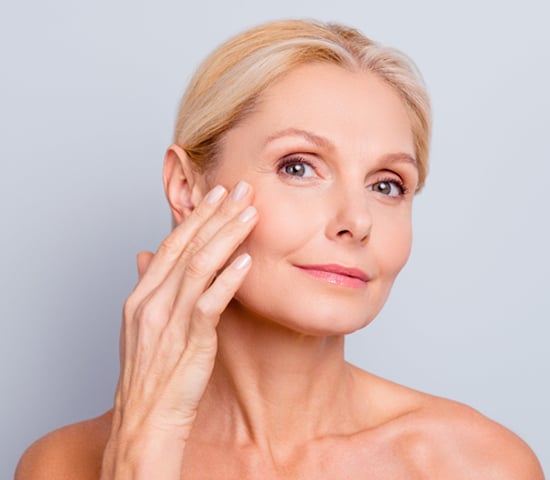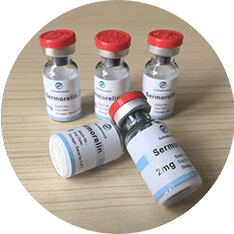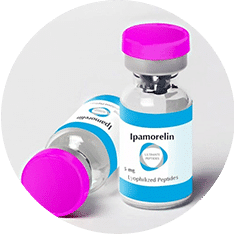
Unlock a More Youthful You With Hormone Replacemment Therapy In Oxford, NJ
Aging is inevitable, and for many, it signals the beginning of a new chapter - one where you cross off bucket list items and live life to the fullest, on your own terms. However, for some women, aging is a horrible prospect, filled with chronic fatigue, irritability, and inability to perform in the bedroom. If you're concerned about life in middle age and beyond, we've got great news: there are easy, proven steps that you can take to help stop the negative effect of aging.
Global Life Rejuvenation was founded to give women a new lease on life - one that includes less body fat, fewer mood swings, and more energy as you age. If you're ready to look and feel younger, it's time to consider HRT (hormone replacement therapy), and growth hormone peptides. These therapies for men and women are effective, safe, and customized to fit your goals, so you can keep loving life as you get older.
HRT, and growth hormone peptide therapies bridge the gap between your old life and the more vibrant, happier version of you. With a simple click or call, you can be well on your way to a brighter future. After all, you deserve to be the one in charge of your wellness and health. Now, you have the tools to do so - backed by science and applied by our team of HRT experts with more than 13 years of experience.
What is HRT?
As women age, their hormones begin to go through changes that affect their day-to-day lives. For women, hormone deficiency and imbalance usually occur during menopause and can cause chronic fatigue, hot flashes, and mood swings, among other issues. Hormone replacement therapy helps correct hormone imbalances in women, helping them feel more vibrant and virile as they age.
Often, HRT treatments give patients enhanced quality of life that they didn't think was possible - even in their 60's and beyond.
The benefits for women are numerous and are available today through Global Life Rejuvenation.
HORMONE REPLACEMENT THERAPY
HRT and Anti-Aging Medicine for Women in Oxford, NJ
As women age, their bodies begin to go through significant changes that affect their quality of life. This change is called menopause and marks the end of a woman's menstrual cycle and reproduction ability. Though there is no specific age when this change occurs, the average age of menopause onset is 51 years old. However, according to doctors, menopause officially starts 12 months after a woman's final period. During the transition to menopause, women's estrogen and other hormones begin to deplete.
As that happens, many women experience severe symptoms. These symptoms include:
- Hot Flashes
- Chronic Fatigue
- Incontinence
- Trouble Sleeping
- Dryness
- Muscle Loss
- Fat Gain
- Mood Swings
The symptoms of hormone deficiency can be concerning and scary for both women and their spouses. However, if you're getting older and notice some of these symptoms, there is reason to be hopeful. Hormone replacement therapy and anti-aging medicine for women can correct imbalances that happen during menopause. These safe, effective treatments leave you feeling younger, healthier, and more vibrant.


What Causes Menopause?
The most common reason for menopause is the natural decline in a female's reproductive hormones. However, menopause can also result from the following situations:
Oophorectomy: This surgery, which removes a woman's ovaries, causes immediate menopause. Symptoms and signs of menopause in this situation can be severe, as the hormonal changes happen abruptly.
Chemotherapy: Cancer treatments like chemotherapy can induce menopause quickly, causing symptoms to appear shortly after or even during treatment.
Ovarian Insufficiency: Also called premature ovarian failure, this condition is essentially premature menopause. It happens when a woman's ovaries quit functioning before the age of 40 and can stem from genetic factors and disease. Only 1% of women suffer from premature menopause, but HRT can help protect the heart, brain, and bones.
Common Issues for Women During Menopause
For many women, menopause is a trying time that can be filled with many hormonal hurdles to jump through. A little knowledge can go a long way, whether you're going through menopause now or are approaching "that" age.
Here are some of the most common issues that women experience during menopause:

Depression
If you're a woman going through menopause and find that you have become increasingly depressed, you're not alone. It's estimated that 15% of women experience depression to some degree while going through menopause. What many women don't know is that depression can start during perimenopause, or the years leading up to menopause.
Depression can be hard to diagnose, especially during perimenopause and menopause. However, if you notice the following signs, it might be time to speak with a physician:
- Mood Swings
- Inappropriate Guilt
- Chronic Fatigue
- Too Much or Too Little Sleep
- Lack of Interest in Life
- Overwhelming Feelings
Remember, if you're experiencing depression, you're not weak or broken - you're going through a very regular emotional experience. The good news is that with proper treatment from your doctor, depression isn't a death sentence. And with HRT and anti-aging treatment for women, depression could be the catalyst you need to enjoy a new lease on life.

Hot Flashes
Hot flashes - they're one of the most well-known symptoms of menopause. Hot flashes are intense, sudden feelings of heat across a woman's upper body. Some last second, while others last minutes, making them incredibly inconvenient and uncomfortable for most women.
Symptoms of hot flashes include:
- Sudden, Overwhelming Feeling of Heat
- Anxiety
- High Heart Rate
- Headache
- Nausea
- Dizziness
Typically, hot flashes are caused by a lack of estrogen. Low estrogen levels negatively affect a woman's hypothalamus, the part of the brain that controls body temperature and appetite. Low estrogen levels cause the hypothalamus to incorrectly assume the body is too hot, dilating blood vessels to increase blood flow. Luckily, most women don't have to settle for the uncomfortable feelings that hot flashes cause. HRT treatments for women often stabilize hormones, lessening the effects of hot flashes and menopause in general.

Mood Swings
Mood swings are common occurrences for most people - quick shifts from happy to angry and back again, triggered by a specific event. And while many people experience mood swings, they are particularly common for women going through menopause. That's because, during menopause, the female's hormones are often imbalanced. Hormone imbalances and mood swings go hand-in-hand, resulting in frequent mood changes and even symptoms like insomnia.
The rate of production of estrogen, a hormone that fluctuates during menopause, largely determines the rate of production the hormone serotonin, which regulates mood, causing mood swings.
Luckily, HRT and anti-aging treatments in Oxford, NJ for women work wonders for mood swings by regulating hormone levels like estrogen. With normal hormone levels, women around the world are now learning that they don't have to settle for mood swings during menopause.

Weight Gain
Staying fit and healthy is hard for anyone living in modern America. However, for women with hormone imbalances during perimenopause or menopause, weight gain is even more serious. Luckily, HRT treatments for women coupled with a physician-led diet can help keep weight in check. But which hormones need to be regulated?
- Estrogen: During menopause, estrogen levels are depleted. As such, the body must search for other sources of estrogen. Because estrogen is stored in fat, your body believes it should increase fat production during menopause. Estrogen also plays a big part in insulin resistance, which can make it even harder to lose weight and keep it off.
- Progesterone: Progesterone levels are also depleted during menopause. Progesterone depletion causes bloating and water retention, while loss of testosterone limits the body's ability to burn calories.
- Ongoing Stress: Stress makes our bodies think that food is hard to come by, putting our bodies in "survival mode". When this happens, cortisol production is altered. When cortisol timing changes, the energy in the bloodstream is diverted toward making fat. With chronic stress, this process repeatedly happens, causing extensive weight gain during menopause.

Low Libido
Lowered sexual desire - three words most men and women hate to hear. Unfortunately, for many women in perimenopausal and menopausal states, it's just a reality of life. Thankfully, today, HRT and anti-aging treatments Oxford, NJ can help women maintain a normal, healthy sex drive. But what causes low libido in women, especially as they get older?
The hormones responsible for low libido in women are progesterone, estrogen, and testosterone.
Progesterone production decreases during perimenopause, causing low sex drive in women. Lower progesterone production can also cause chronic fatigue, weight gain, and other symptoms. On the other hand, lower estrogen levels during menopause lead to vaginal dryness and even vaginal atrophy or loss of muscle tension.
Lastly, testosterone plays a role in lowered libido. And while testosterone is often grouped as a male hormone, it contributes to important health and regulatory functionality in women. A woman's testosterone serves to heighten sexual responses and enhances orgasms. When the ovaries are unable to produce sufficient levels of testosterone, it often results in a lowered sex drive.

Vaginal Dryness
Often uncomfortable and even painful, vaginal dryness is a serious problem for sexually active women. However, like hair loss in males, vaginal dryness is very common - almost 50% of women suffer from it during menopause.
Getting older is just a part of life, but that doesn't mean you have to settle for the side effects. HRT and anti-aging treatments for women correct vaginal dryness by re-balancing estrogen, progesterone, and testosterone. When supplemented with diet and healthy living, your vagina's secretions are normalized, causing discomfort to recede.

Fibroids
Uterine fibroids - they're perhaps the least-known symptom of menopause and hormone imbalances in women. That's because these growths on the uterus are often symptom-free. Unfortunately, these growths can be cancerous, presenting a danger for women as they age.
Many women will have fibroids at some point. Because they're symptomless, they're usually found during routine doctor exams. Some women only get one or two, while others may have large clusters of fibroids. Because fibroids are usually caused by hormone imbalances, hysterectomies have been used as a solution, forcing women into early menopause.
Advances in HRT and anti-aging medicine for women give females a safer, non-surgical option without having to experience menopause early. At Global Life Rejuvenation, our expert physicians will implement a customized HRT program to stabilize your hormones and reduce the risk of cancerous fibroid growth.

Endometriosis
Endometriosis symptoms are much like the effects of PMS, and include pelvic pain, fatigue, cramping, and bloating. While doctors aren't entirely sure what causes this painful, uncomfortable condition, most agree that hormones - particularly xenoestrogens - play a factor.
Endometriosis symptoms are much like the effects of PMS and include pelvic pain, fatigue, cramping, and bloating. While doctors aren't entirely sure what causes this painful, uncomfortable condition, most agree that hormones - particularly xenoestrogens - play a factor.
Xenoestrogen is a hormone that is very similar to estrogen. Too much xenoestrogen is thought to stimulate endometrial tissue growth. HRT for women helps balance these hormones and, when used with a custom nutrition program, can provide relief for women across the U.S.
Is HRT for Women the Right Answer?
Hormone stability is imperative for a healthy sex drive and for a normal, stress-free life during menopause. HRT and anti-aging treatments for women balance the hormones that your body has altered due to perimenopause or menopause.
HRT for women is a revolutionary step in helping women live their best lives, even as they grow older. However, at Global Life Rejuvenation, we know that no two patients are the same. That's why we specialize in holistic treatments that utilize HRT, combined with healthy nutrition, supplements, and fitness plans that maximize hormone replacement treatments.
If you've been suffering through menopause, is HRT the answer? That's hard to say without an examination by a trusted physician, but one thing's for sure. When a woman balances her hormone levels, she has a much better shot at living a regular life with limited depression, weight gain, mood swings, and hot flashes.
Here are just a few additional benefits of HRT and anti-aging treatments for females:


Benefits of HRT and Anti-Aging Medicine for Women in Oxford, NJ
Hormone imbalance causes a litany of issues. But with anti-aging treatments for women, females can better process calcium, keep their cholesterol levels safe, and maintain a healthy vagina. By replenishing the body's estrogen supply, HRT can relieve symptoms from menopause and protect against osteoporosis. But that's just the start.
Global Life Rejuvenation's patients report many more benefits of HRT and anti-aging medicine for women:
- Fewer Mood Swings
- Thicker Hair
- Stronger Bones
- Less Body Fat
- More Energy
- More Stamina
- Increased Sex Drive and Pleasure Sensations
- Better Cognitive Functions
- Improved Pain Receptors
- Less Hot Flashes and Night Sweats
- Lower Triglycerides
- Fewer Bladder Infections
If you're ready to feel better, look better, and recapture the vitality of your youth, it's time to contact Global Life Rejuvenation. It all starts with an in-depth consultation, where we will determine if HRT and anti-aging treatments for women are right for you. After all, every patient's body and hormone levels are different. Since all our treatment options are personalized, we do not have a single threshold for treatment. Instead, we look at our patient's hormone levels and analyze them on a case-by-case basis.

HRT from Global Life Rejuvenation
At Global Life Rejuvenation, we help women rediscover their youth with HRT treatment for women. We like to think of ourselves as an anti-aging concierge service, guiding and connecting our patients to the most qualified HRT physicians available. With customized HRT treatment plan for women, our patients experience fewer menopausal symptoms, less perimenopause & menopause depression, and often enjoy a more youth-like appearance.
Reverse Aging with Growth Hormone Peptides
Growth hormone peptides are an innovative therapy that boosts the natural human growth hormone production in a person's body. These exciting treatment options help slow down the aging process and give you a chance at restoring your youth.

What is Sermorelin?
Sermorelin is a synthetic hormone peptide, like GHRH, which triggers the release of growth hormones. When used under the care of a qualified physician, Sermorelin can help you lose weight, increase your energy levels, and help you feel much younger.

Benefits of Sermorelin
Human growth hormone (HGH) therapy has been used for years to treat hormone deficiencies. Unlike HGH, which directly replaces declining human growth hormone levels, Sermorelin addresses the underlying cause of decreased HGH, stimulating the pituitary gland naturally. This approach keeps the mechanisms of growth hormone production active.
- Benefits of Sermorelin include:
- Better Immune Function
- Improved Physical Performance
- More Growth Hormone Production
- Less Body Fat
- Build More Lean Muscle
- Better Sleep

What is Ipamorelin?
Ipamorelin helps to release growth hormones in a person's body by mimicking a peptide called ghrelin. Ghrelin is one of three hormones which work together to regulate the growth hormone levels released by the pituitary gland. Because Ipamorelin stimulates the body to produce growth hormone, your body won't stop its natural growth hormone production, which occurs with synthetic HGH.
Ipamorelin causes growth hormone secretion that resembles natural release patterns rather than being constantly elevated from HGH. Because ipamorelin stimulates the natural production of growth hormone, our patients can use this treatment long-term with fewer health risks.

Benefits of Ipamorelin
One of the biggest benefits of Ipamorelin is that it provides significant short and long-term benefits in age management therapies. Ipamorelin can boost a patient's overall health, wellbeing, and outlook on life.
When there is an increased concentration of growth hormone by the pituitary gland, there are positive benefits to the body. Some benefits include:
- Powerful Anti-Aging Properties
- More Muscle Mass
- Less Unsightly Body Fat
- Deep, Restful Sleep
- Increased Athletic Performance
- More Energy
- Less Recovery Time for Training Sessions and Injuries
- Enhanced Overall Wellness and Health
- No Significant Increase in Cortisol
Your New, Youthful Lease on Life with HRT for Women
Whether you are considering our HRT and anti-aging treatments for women in Oxford, NJ, we are here to help. The first step to reclaiming your life begins by contacting Global Life Rejuvenation. Our friendly, knowledgeable HRT experts can help answer your questions and walk you through our procedures. From there, we'll figure out which treatments are right for you. Before you know it, you'll be well on your way to looking and feeling better than you have in years!
 866-793-9933
866-793-9933
Request a Consultation
Latest News in Oxford, NJ
Covanta has shut down its Warren County trash incinerator. But it might not be permanent.
Steve Novakhttps://www.lehighvalleylive.com/warren-county/2019/04/covanta-has-shut-down-its-warren-county-trash-incinerator-but-it-might-not-be-permanent.html
After 30 years in Warren County, Covanta’s trash-to-energy incinerator has ceased operation. But the Oxford Township facility won’t be dismantled, lea...
After 30 years in Warren County, Covanta’s trash-to-energy incinerator has ceased operation. But the Oxford Township facility won’t be dismantled, leaving open the possibility that it could one day be fired up again.
At its peak, Covanta Warren Energy Resource Co. LLC employed 39 and could process 550 tons of municipal solid waste a day, generating up to 13.5 megawatts of energy.
The incinerator stopped at the end of March and now a skeleton crew remains as the facility is mothballed, Covanta spokeswoman Nicole Robles confirmed Thursday. Employees were offered jobs at other Covanta sites.
But Covanta is not fully decommissioning the 22-acre site and will retain ownership, meaning it could find use again if the market demands it.
The shutdown was announced at the close of 2018′s second quarter, when company executives cited the Warren County facility’s size and local market conditions as limiting its value. The announcement came just a few months after Covanta applied to the state for a permanent permit to burn liquid waste, a process it had experimented with for two years prior.
Steve Novak may be reached at [email protected]. Follow him on Twitter @SteveNovakLVL and Facebook. Find lehighvalleylive.com on Facebook.
If you purchase a product or register for an account through a link on our site, we may receive compensation. By using this site, you consent to our User Agreement and agree that your clicks, interactions, and personal information may be collected, recorded, and/or stored by us and social media and other third-party partners in accordance with our Privacy Policy.
Only in Jersey? The Oxford English Dictionary wants to hear it
Karen Crokehttps://www.northjersey.com/story/entertainment/2018/06/05/new-jersey-nj-slang-could-become-part-oxford-english-dictionary/673373002/
Welcome to Jersey, where the sandwiches are fat, GSP can refer to a mall or a major highway and ripper isn't part of the moniker for a serial killer.If you're not from around here, you might find yourself a bit confused. On your way "down the shore" you might hear the words "Benny" and "shoobie" thrown around.If you're stopping at a diner, what will you have on that sandwich? Is it Taylor Ham or... (gulp) pork roll? Disco fries with that?It would be a lot easier if these words...
Welcome to Jersey, where the sandwiches are fat, GSP can refer to a mall or a major highway and ripper isn't part of the moniker for a serial killer.
If you're not from around here, you might find yourself a bit confused. On your way "down the shore" you might hear the words "Benny" and "shoobie" thrown around.
If you're stopping at a diner, what will you have on that sandwich? Is it Taylor Ham or... (gulp) pork roll? Disco fries with that?
It would be a lot easier if these words were in the dictionary. Well, they could be soon.
As part of its 90th birthday celebration, the Oxford English Dictionary wants the public's help in identifying distinctive words and phrases that, while familiar to you, are totally foreign to people from other parts of the English-speaking world.
The first, called "Words Where You Are,"’ is designed to uncover those regional words like wedge, pumping and flip flops.
"The OED has always cooperated with the public for contributions," said associate editor Jeff Sherwood. "In the 19th century, it was difficult to collect printed material, so the OED used public advertisements asking people that if they came across an unusual word in a book to write it down and send it in."
Fast-forward to the 21st century and the OED is using Twitter to help uncover new words. You can tweet #WordsWhereYouAre or go to the OED website to suggest one.
And although the OED has traditionally been a British dictionary, Sherwood says the editors are "absolutely determined to focus as much as possible on American and world English. For this edition, we have shifted it in a way to be less focused on asking for specific info, but gleaning from users what they think belongs in the dictionary."
But, don't expect to submit your word today and see it pop into the dictionary tomorrow.
Once a word is considered for inclusion, it undergoes a rigorous vetting process. With 50 editors researching the words in New York. It takes at least 18 months of vetting for a word to wind up printed in the dictionary.
Problems can arise in that time, too.
For instance, when editors know there is evidence of the word, but can't find it. The famous example, says Sherwood, was mullet, an '80s hairstyle.
"Everyone associated it with the 1980s and we were determined to find evidence of it the 1980s. When we asked for help with that, it brewed some controversy; maybe it might have come from Australia, for example," Sherwood says.
Down the shore:How NJ beach towns got their names
Jersey Icons:The Jersey diner - more than a place to eat
State of Gambling:Waves of change rock New Jersey gambling industry
"It speaks to how extensive the research and evaluation process is," Sherwood says. "We go through every single suggestion. Does it meet the inclusion policy? Can we find substantial evidence of this in written form? Does it exist for a long enough period of time? We are being a little more nuanced with the regional terms because we want to promote this language that's associated with a specific place."
Sherwood says that although it's the 90th anniversary year, the new edition of the OED, its third revision, won't be finished any time soon. "We are revising the edition," he says. "The second was in 1989; the first in 1928. That gives you a sense of the timelines."
When could you expect to see your word in the big book of words? Sherwood says they are shooting for a 2040 publication.
Say what?
The Oxford English Dictionary wants to hear about words and expressions that are distinctive to New Jersey.
Send your suggestions to the website. There's a quick form to fill out on the Oxford English Dictionary's website. Or join the conversation on Twitter with the hashtag #wordswhereyouare.
NJ Charter School Sends Students To Elite U.S. Universities And England's Oxford University For Summer School
TAPintohttps://www.tapinto.net/towns/plainfield/sections/education/articles/nj-charter-school-sends-students-to-elite-u-s-universities-and-england-s-oxford-university-for-summer-school-7f371957-342a-4dac-b895-7907a45c6d38
Students from College Achieve Public Schools attend the Summer of a Lifetime program at Princeton UniversityPhoto Credit: Brian Taylor By College Achieve Public Charter SchoolPublishedAugust 9, 2022 at 2:56 PMRED BANK, NJ — More than 120 rising 9th-12th graders from College Achieve Public Charter School (CAPS) — a network of public charter schools serving predominantly low-income and students of color in Paterson, Plainfield, North Plainfield...
Students from College Achieve Public Schools attend the Summer of a Lifetime program at Princeton UniversityPhoto Credit: Brian Taylor
By College Achieve Public Charter School
PublishedAugust 9, 2022 at 2:56 PM
RED BANK, NJ — More than 120 rising 9th-12th graders from College Achieve Public Charter School (CAPS) — a network of public charter schools serving predominantly low-income and students of color in Paterson, Plainfield, North Plainfield, Neptune Township and Asbury Park — returned last week from summer school at some of the best universities in the nation as well as Oxford University in England through its inaugural summer program. Called the Summer Of A Lifetime (SOAL), the program offered students, some of whom haven’t traveled outside the state in which they live, an immersive experience on a college campus as well as exposure to travel and different cultures through its partnership with Oxford University.
“As lifelong educators in communities with high poverty, we’ve always seen bright students who excelled in high school, got into top universities, and struggled to fit or even dropped out their first year because they felt uncomfortable and out of place. We had to change that,” said Michael Piscal, CEO and Founder of College Achieve Public Schools. “Filling that social capital gap for our students is one of our main goals at College Achieve, which is why we’re sending them on ski trips, offering students internship opportunities and summer jobs and taking them to see plays at the local theater. These are all activities that are not part of their daily lives, but the exposure will help them feel less like outsiders and more like they belong everywhere that their hard work and abilities take them in life.”
For one to three weeks, students immersed themselves in the college experience. They attended classes taught by professors, adjuncts or Rhodes Scholars at the universities, lived in the dorms and experienced the typical day of a student on a college campus. They also visited sites around the schools including Stonehenge and Windsor Castle in England and the White House, the U.S. Capitol Building and Lincoln Memorial in Washington, D.C.
Sign Up for FREE Plainfield Newsletter
Get local news you can trust in your inbox.
This site is protected by reCAPTCHA and the Google Privacy Policy and Terms of Service apply.
Studies show that these intangible travel, cultural and life experiences help students feel more culturally comfortable on campus. In the United States, “white students at public colleges are two and a half times more likely to graduate than Black students, and 60 percent more likely to graduate than Latino students.” In fact, one in four first-generation college students do not return for their second year of college and one in three first-generation college students with parents who have no college experience drop out prior to completing a degree.
“There are so many students for whom college is not a given, who don’t have family members and friends telling them stories about their time in college. When they eat at the dining hall, sit in college classrooms, attend classes taught by professors and just spend the day on a university campus, we’re showing them that they belong at these schools, that it is possible for them to get into the best colleges in the nation and that they can be successful,” said Brian Taylor, who founded CAPS’ Princeton University SOAL program. “It’s not an exaggeration to say that for many of our College Achieve scholars, these few weeks are going to change their lives and mold their hopes for the future they want to build.”
CAPS was founded to help close the achievement gap between students of color and their White and Asian peers and to prepare students to get to and through college. They held their first graduation in May, where 100 percent of the seniors at College Achieve Central were accepted to at least one college or university and each graduated having taken at least three AP classes. Programs like SOAL will become a critical part of developing well-rounded students who are ready for university.
“We’re giving the kids a once-in-a-lifetime opportunity with an experience they would never have had at this juncture in their young lives,” said Jodi Henderson McInerney, Chief Operating Officer & Executive Director of CAPS. “I’ve already seen such growth in their independence after just a few short days of travel. The lessons they’re learning about themselves and how to navigate the world in a safe way that allows them to explore are priceless.”
State testing data shows their program is working. CAPS schools far outperform their neighborhood public schools. Most recently, CAPS students excelled on the Start Strong state testing that measured learning loss after the pandemic. The results from all three College Achieve schools showed their students needed significantly less support than their peers in neighboring schools in math and ELA.
“Many of our scholars had several firsts by participating in our SOAL program: the first time on a plane, the first time leaving America, and the first time visiting England, Harvard, and/or Princeton,” said Dr. Gemar Mills, Chief Academic Officer & Executive Director of College Achieve Paterson Charter School. “College Achieve school leaders know that being able to envision yourself at a top university is a critical first step in our students believing they can be successful anywhere their talents and hard work takes them.”
Similarly, CAPS plans to expand the SOAL program in the summer of 2023 due to its popularity among students and the positive impact it has already had on its participating scholars.
“We hope to send every high school student away at least one summer for the experience of a lifetime to an amazing college or university. We think it will make a world of difference,” Corri Ravare, Executive Director of College Achieve Central Charter School in Plainfield and North Plainfield.
Why Covanta is on track to shut down Warren County trash incinerator next spring
Steve Novakhttps://www.lehighvalleylive.com/warren-county/2018/12/why-covanta-is-on-track-to-shut-down-warren-county-trash-incinerator-next-spring.html
Last April, Covanta was seeking permission to permanently expand its trash-to-energy operation in Warren County.Next April, it will shut the whole thing down.A Covanta spokesman this week confirmed that the company is on track to close its ...
Last April, Covanta was seeking permission to permanently expand its trash-to-energy operation in Warren County.
Next April, it will shut the whole thing down.
A Covanta spokesman this week confirmed that the company is on track to close its Oxford Township facility -- Covanta Warren Energy Resource Co. LLC -- next spring, bringing an end to the 30-year operation.
The 22-acre energy-from-waste facility employed 39 at its peak and could process 550 tons of municipal solid waste a day, generating up to 13.5 megawatts of energy, according to the company.
The decision to shutdown the operation was announced at the close of 2018′s second quarter.
“This was a difficult decision as the facility has run consistently well and the team has done a fantastic job there,” Covanta CEO Steve Jones said during a quarterly earnings conference call, according to a transcript published online. “However given its size and the challenging local market conditions, we didn’t see its potential to be a significant financial contributor going forward.”
Later in the call, Jones said that closing Covanta Warren would depend on finding a buyer for the property -- "If we don’t sell it, we are never going to shut it down."
But on Tuesday, communications director James Regan said that despite no success finding a buyer yet, everything is on track for an April shutdown.
The process of closing down was intended to take several months, both for the employees who Regan said will be offered positions elsewhere with Covanta, and for the 15 or so trash haulers in Warren and other nearby counties who use the facility.
Regan said the possibility of shutting down Covanta Warren had been tossed around a few years before the July announcement.
Last April, Covanta applied to the state environmental department for a permanent permit to burn liquid waste, a process it had experimented with for two years prior. A permit would have helped the economics of the site, Regan said, but likely not enough to keep it open.
However, he said the company has filed only a short-term closing plan with the DEP -- he described it as a basic mothball of the facility, which preserves the possibility of reopening “if the situation changes.”
Nicholas Air’s successful growth and cleanliness ethic has them leading the charge for Mississippi being the home of Innovative Private Air Travel ®
Staff Reporthttps://www.oxfordeagle.com/2020/09/30/nicholas-airs-successful-growth-and-cleanliness-ethic-has-them-leading-the-charge-for-mississippi-being-the-home-of-innovative-private-air-travel/
Sponsored by Nicholas AirBy Davis CoenThe main reason Oxford-based Nicholas Air has maintained the highest standard for safety and cleanliness all throughout the current health pandemic, is simply because they had always been doing so.Sign up for our daily email newsletter The quality and cleanliness of their aircraft has been the primary concern of the private jet company ever since it began back in 1997. Nicholas Air President and CEO Nicholas (NJ) Correnti considers this high standa...
Sponsored by Nicholas Air
By Davis Coen
The main reason Oxford-based Nicholas Air has maintained the highest standard for safety and cleanliness all throughout the current health pandemic, is simply because they had always been doing so.
Sign up for our daily email newsletter
The quality and cleanliness of their aircraft has been the primary concern of the private jet company ever since it began back in 1997. Nicholas Air President and CEO Nicholas (NJ) Correnti considers this high standard to be the most important element of his operation, and has always strived to be the best–and furthermore–exceed all the rest in the business.
“That remains true,” NJ Correnti reinforced recently, “and I’ve watched how in the current environment, our entire team, from the hangar staff to the flight line, have embraced that Nicholas Air Standard for safety and cleanliness.” He continued, “I want our Members and their guests to get on board an airplane with us, and know from the first step that no detail was left undone. We promise them that peaceful, easy feeling, and our team rises to that occasion each day.”
From the fleet of vehicles that drive around much of the country cleaning the planes–so they’re ready the following day–to the Captain’s final touch and approval shortly before passengers board the aircraft, every effort is made for Nicholas Air’s performance to be superior to competitors, in this regard.
Credit for cleanliness is also given partly to Nicholas Air Members, who often return to fly on the same aircraft–so naturally would want to keep them up to their own expectations.
During an interview on September 11th at University-Oxford Airport, Nicholas Air Vice President of Sales & Marketing, Peder von Harten, also spoke to the importance of a Nicholas Air Member’s first impression upon boarding one of the 23 planes they currently have in the air.
“That’s really the promise that he (NJ) had when he first started this business…to deliver a product that was better than what you’re going to find elsewhere, and that really starts with getting on board,” he said. “You look at the interior of an airplane for the entire flight …so you do start to notice little subtle things about the plane,” von Harten added. “He’s been really passionate about providing a safe airplane. Since day one, 23 years ago when he started this company–that’s been his mantra. We wanted a better product than what you’re going to find elsewhere.”
Also regarding the cleanliness of the aircraft, Nicholas Air Director of Hangar Operations Jackson Duncan gave some insight into the behind-the-scenes cleaning undertaking. “We receive an aircraft into an airport that we will travel to. We’ll get on board and by way of a thorough checklist, we make sure the aircraft is detailed top-to-bottom,” said Duncan. “We go through every nook and cranny.”
While commercial airlines have been struggling and seeking huge bailouts, some in private aviation have seen an uptick
It’s been an exciting past several months for Nicholas Air, as they’ve added two new Embraer Phenom 300Es–a best-selling jet–to their already existing fleet of the popular aircraft. “We got these new, directly from the manufacturer. This is exceptionally rare because there are not a whole lot of companies that are still taking deliveries of new airplanes this year,” said the VP von Harten. “So for us to be able to do it speaks to both our financial strength and the growth of demand our company’s programs,” he added. “More and more people are getting into flying private, while at the same time protecting their families.”
Among the other aircraft that Nicholas Air offers are the Phenom 100, Pilatus PC-12, Cessna Citation CJ3, Citation Latitude, and the Bombardier Challenger 300–the latest addition prior to the pair of Phenom 300Es.
NJ Correnti provided additional insight on his company’s prosperity, which includes the emphasis on the relationship with its Members. “Our approach to fleet growth is predicated on data and analytics, but a key part is the feedback from our Members. Our Members are an integral part of all of our decisions at Nicholas Air, as we are here to provide a program that best suits how they want to fly, and what they desire most from their private aviation relationship.” Correnti continued, “we look for trends in their purpose of trip, we ask for their feedback on various aircraft types, and we take all of that information to help us make the next round of decisions. This year, it was clear that the demand for our product is at a very high level, and our recent fleet growth is a testament to that.”
Each and every flight calls for some level of personalization
As the guest of a luxury hotel might require particular accommodations, similarly do many who prefer private air travel. This communication begins with the relationship between the Member and the Member Services team, according to Correnti. “Our leaders in that group work tirelessly with their teams to make sure we never lose that personal touch,” he said. “Not every Member is the same and not all travel for the same reasons. You may have the business traveler that prefers complete quiet on board the plane and three specific newspapers, or you may have the leisure traveler whose kids love to interact with the pilots—knowing these details and knowing why our Members are traveling allows the Member Services team to relay that to the pilots so that every mission is custom-tailored to that specific Member,” said the CEO of nearly a quarter century.
What’s the geographic significance of their home in Oxford?
It was as a youth in Arkansas that NJ Correnti began feeling drawn to aviation. When he finally achieved his longtime goal, set for himself as a teen pilot–to one day own a private aviation company–he brought with it attention to Southern hospitality. This, among other assets Oxford has ingrained in its appeal–including quality of life, greats schools, dining and nightlife options–are a great benefit to his operation, but also is its position in the Mid-South.
“Operationally, Oxford offers us the ability to service our Membership at perhaps the highest level,” said Correnti. “Yes, you have the schools and quality of living for our team, but being so centrally-located allows us to reach all corners of our operation without issue. From Oxford, we can touch both coasts, we can head north to Canada and Alaska, or south to the Caribbean and into South America. They are all equidistant and are done in relative ease in our program. Not being in New York or Boston or Miami allows us to keep our costs down as well, ensuring that each dollar can go into the operation so that we can better serve our Members, as opposed to overpriced real estate, congested airspace, and heavy commutes to the airport.”
The most outdoor-pursuit-friendly brand in the industry
“You’ll see dogs on board–I’d say two-thirds of Nicholas Air flights. It’s an interesting phenomenon because there are companies that will say no dogs at all, and for us, they are part of the family,” said Peder von Harten. Numerous Members have ranches and hunting camps at their destinations and prefer traveling with their canine companions and with their own guns.
The VP of Sales & Marketing said of his own Labrador Retriever, “she’ll get on the airplane, she’ll lay at my feet, and fall asleep at my feet until we land,” said von Harten. “Almost like clockwork she’ll pass out–and that’s a really common feature for a lot of dogs.”
More Oxford Town
Disclaimer:


